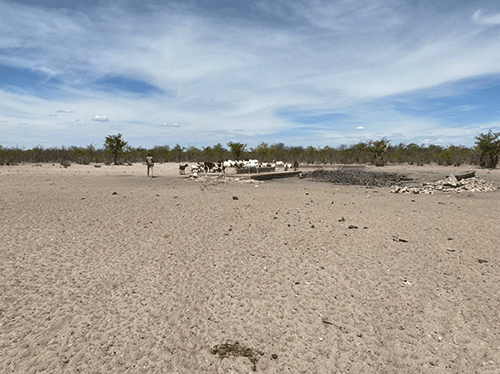For at least seven years, the Kunene region has experienced severe drought, and farmers are extremely worried.
“The situation remains dire, and it keeps getting worse every year. We are losing our livestock and if it does not rain soon, we will have nothing more left,” said a farmer in the Khorixas district, Salmon McKenzy.
McKenzy told New Era that since 2019, many farmers have lost a significant number of livestock, particularly goats. Those whose livestock had not yet succumbed to starvation might as well lose them now.
He said some have also given up on farming and migrated to urban areas in search of jobs and better livelihoods.
Another farmer based in the Otjokavari village in the Sesfontein constituency, Amon Kapi, said the situation has forced them to move their livestock outside the region.
“There is no grazing pasture at all, and we only rely on the fodder we get from the government.
The region is extremely dry, and some boreholes that were drilled need renovation,” he added.
The mostly impacted areas are Opuwo Urban, Opuwo Rural, Epupa, Khorixas and Sesfontein.
Last year, Kunene governor Marius Sheya constituted a task team to investigate how to mitigate the effects of the drought by liaising with key offices, ministries and agencies and other stakeholders.
The government has also made N$21 million available to the region for water provision.
A total of 16 boreholes have been drilled, 19 water points have been set up, and 18 boreholes have been rehabilitated.
The Kunene Regional Council’s public relations officer Tulimekondjo Pandeni told New Era that although the devastating negative impacts of climate change continue to weigh heavily on the vulnerable communities and farmers, the distribution of fodder for livestock is ongoing as well as drought relief food for households most affected.
“For this year, we could only hope for rainfall to come so that we do not experience worsened conditions like those of last year,” she said.
According to the drought assessment report of 2021, there is a significant reduction in the population of livestock and wild animals in the region as a result of the effects of prolonged drought.
“For the majority of the farmers in the region, having livestock means food security while the opposite leads to poverty and food insecurity,” the report reads.
It further indicates that some farmers have relocated from their areas of origin to other areas in search of better living conditions, be it grazing for their livestock and/or water for both people and livestock.
“The team observed many abandoned houses in most visited areas. The relocation of farmers has affected families negatively, where learners were forced to drop out of school and losing the education opportunity. Early childhood development for children is equally affected negatively by the relocation of farmers,” the report continues.
As a drought-coping mechanism, community members at Serra Cafema have, for example, resorted to eating wild fruits due to a lack of food.
-ashikololo@nepc.com.na


